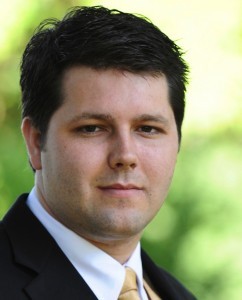Last week we published a blog post highlighting the MIT Technology Review’s 2015 list of 35 innovators under the age of 35.
 This list included Travis Deyle who was a member of the Computing Community Consortium’s (CCC) CI Fellow program in 2011 and currently works at Google X Life Sciences where he has been part of a team that developed glucose-sensing and autofocusing contact lenses.
This list included Travis Deyle who was a member of the Computing Community Consortium’s (CCC) CI Fellow program in 2011 and currently works at Google X Life Sciences where he has been part of a team that developed glucose-sensing and autofocusing contact lenses.
Travis earned a PhD in healthcare robotics from Georgia Tech in 2011, where he built some of the first mobile robots capable operating in real homes. These robots could be used for tasks such as robot-mediated medication delivery fetching and retrieving tagged objects, and helping older adults and people with motor impairments.
In 2012, as part of the CI Fellows program Travis worked with Dr. Matt Reynolds at Duke University where he
collaborated on RFID-like systems with integrated sensing that could operate at WiFi-like data rates (many megabits per second) on a small fraction of the power (micro-Watts). [They] developed tags to perform health monitoring (electrocardiogram (ECG) sensing) and others to create “cyborg dragonflies” (neural recording from dragonflies in flight). [They] also developed some preliminary robotic systems to interact with environmental sensor tags — especially in remote, hard-to-reach locations.
I asked Travis what role the CI Fellowship program played in his career thus far and he had this to say:
The CI Fellowship played a major role in my career path — I enjoyed my time at Duke University, appreciated the opportunities, and greatly benefited from the facilities, faculty, and other students... I sincerely hope that other, similar programs gain traction… because they provide valuable time and flexibility for PhD graduates to explore their passions (and do good science!) before being subject to the harsh externalities of a “career” in academia or industry. The time spent as a CI Fellow were certainly formative for me.
We are glad to hear that the CI Fellowship program was influential and supportive to Travis and we wish him continued success in his career.
In 2013, the CCC launched another program to support postdocs called the Postdoc Best Practices. This program has given grants to three consortiums of academic institutions in Arizona, Washington, and New York in an endeavor to discover new best practices for post docs in computing.
To learn more about the Postdocs Best Practices Program see here.









